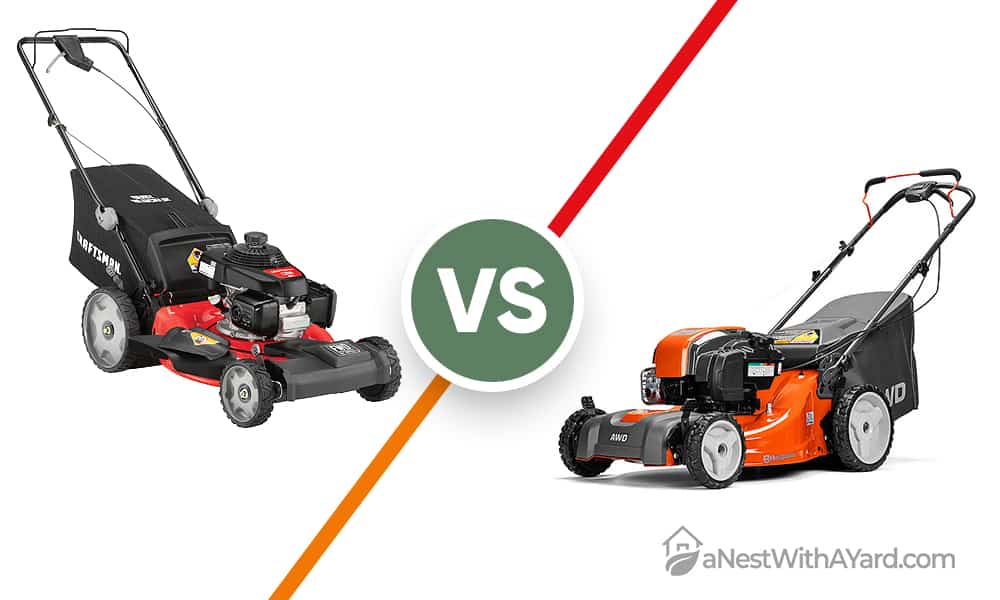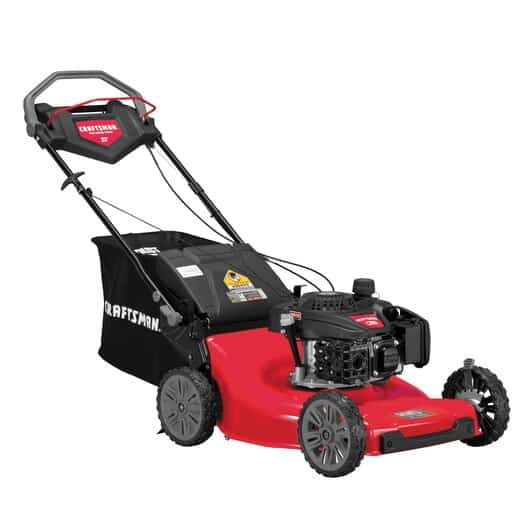Front-wheel-drive Vs Rear-wheel-drive Lawn Mower In 2022

If you’re in the market to purchase a new mower, remember there are several factors that should be considered before making your decision. A key aspect to note is whether the model is a front wheel or rear wheel drive, with the most popular choice being the front wheel drive.
To help you choose, let’s dive into a more in depth analysis and comparison of the front wheel and rear wheel drive mowers.
Introducing The Contenders: Front Wheel Vs Rear Wheel Drive Mowers

Rear wheel drive and front wheel drive are two of the model options that you will be faced with when looking to purchase a self propelled mower. A mower that is self propelled will have an engine that powers not only the mower’s blades but also its wheels.
Keen to learn more about the specific physics of self propelled mowers? Check out this article!
In some cases, all four wheels are in a self propelled mower are powered but, unless you are dealing with a particularly bumpy and uneven lawn, it is more likely that you’ll just be looking at front or rear wheel drive. Four wheel drive self propelled mowers may be more commonly found in farming equipment and on riding lawn mowers.
Having a self propelled mower means that you are not required to push the mower across the lawn, but rather you will just have to guide it while it does the work. This will ultimately save you time and concerns about early back issues. Your self propelled mower can run from 3 to 3.5 miles per hour, which will have you finished with your mowing chores in no time!
Not sure what to look for when choosing a new mower? Have a look at this informative video by The Lawn Care Nut for a detailed look into the factors you should consider!
Front Wheel Drive Mowers

The front wheel drive mower, as the name suggests, is propelled from its front wheels. The mower’s engine directs the power to the front wheels and the traction created causes the rear wheels to roll along with them.
Being a bit less complicated to construct than rear wheel drive mowers, you will generally find front wheel mowers to be more cost-efficient, making them the more popular option for most.
With only the front wheels motorized, navigating your way around tight corners, trees and potted plants is a relatively painless process. All you need to do is apply enough pressure to the handlebars to lift the front wheels slightly and shift the direction of your mower.
With the wheels at the back not being able to automatically rotate, there is no need to cut the engine every time you want to turn around or avoid plowing through your flower bed.
If you happen to run into issues with your front mower, it’ll be handy to have an idea of how to do a quick check of its front drive. This YouTube video by Small Engine DIY shows you how!
Generally speaking, front wheel mowers are cheaper and more widely available. This can have a great impact on its efficiency and your overall user experience.
This is what makes them ideal for homeowners and the maintenance of smaller and perhaps more oddly shaped lawns. However, if you are maintaining a larger area with more challenging and uneven terrain, it might be in your best interest to consider investing in a rear wheel drive mower. Both models have their perks, but your specific needs will dictate which option will benefit you the most.
A front drive mower is also often easier to pull backward, which may seem like an insignificant feature but it can make guiding into a snug storage area far easier. Another seemingly small but nifty function of the easily maneuverable front wheel drive mower is that it can take on the role of leaf shredder (if you do not already own one). You can easily run this model back and forth over a pile of leaves, conveniently shredding them for mulch-making purposes.
To get a better idea of how to use your lawn mower to make mulch, check out the video below by YouTube user Grass Doctor:
The front wheel mower is, for the most part, a safe, cost-effective and multifunctional choice. However, its major failing is that it does not respond well to uneven surfaces/terrain.
If you are tending to a smaller, domestic garden that lies flat, you will have no problem with front wheel drive mowers. However, if the area is hilly or uneven, you will find yourself needing to exert greater energy to push your mower up the hill while keeping the wheels flat on the ground.
You will experience a similar thing if you are working on ground that is particularly soft or wet. The front wheels will be at risk of digging into the earth and bring your mowing to frequent and frustrating stops. It is also worth noting where the bag on your mower is. A bag located at the back of your mower can affect the weight distribution and create the same frustrations. When it fills up with clippings, it will weigh down on the rear wheels and lift the front of your mower.
Pros
- More cost-effective and widely available
- Easier to maneuver around smaller yards
- Ideal for flat surfaces
Cons
- Difficult to navigate uneven terrain
- Will require you to push and strain when going up hills
Rear Wheel Drive Mowers

As you would no doubt guess, rear wheel drive mowers are powered from the rear wheels rather than the front. This feature makes it the more sensible option if you are working on a hillier lawn or a lawn with looser earth.
Your rear wheel drive mower’s back wheels are placed more securely on the ground, meaning that traction will not be lost when going up hills and you don’t have strain to keep your mower level.
This, however, makes it trickier to redirect and quickly navigate around obstacles as you will have to cut the power every time you wish to turn the mower. For this reason, it’s more suited to larger areas with fewer obstacles.
If you have a relatively expansive and clear patch of lawn, you might be considering lawn striping. This is a technique where you bend your grass in different directions, changing its color and creating interesting patterns.
In order to do this, you will need to attach a lawn roller to your mower and be able to guide your mower with a steady hand to avoid wonky lines. A rear wheel drive model will make this endeavor far easier as the wheels at the back act as an anchor and keep your mower stable and straight.
The specifics and manufacturing of a rear wheel drive motor is slightly more complex than that of a front wheel drive mower, making the cost of production and purchase slightly higher.
Pros
- Ideal when maintaining uneven ground
- Easier to steer up hills
- More stable, allowing you to keep your machine in a straight line
Cons
- More expensive to produce which ultimately makes the purchasing price higher
- Trickier to navigate on smaller lawns and around obstacles
Still not sure which to choose between front and rear wheel mowers? Check out this comparison video by YouTube user Garden Tools & Instruments:
Front Wheel Drive Vs Rear Wheel: Features Face-To-Face
Cost

The construction of rear wheel drive mowers is a more involved process, with the arrangement of the motor being slightly more complicated. The back wheels on the model will also be bigger and more sturdy. As a result, rear wheel drive mowers will be more expensive. This may be worth your while if you are dealing with uneven and more expensive terrain.
Alternatively, a front wheel mower is far kinder on the wallet. Therefore, for an everyday house owner, a front wheeled mower is the more economical and sensible option.
Winner: Front wheel drive
Maneuverability
To reposition a front wheel drive mower is far quicker. It simply requires you to apply a bit of weight on the handles to lift the front wheels slightly and then you can redirect your mower’s course.
Your rear wheel drive lawn mower requires a bit more effort. When wanting to turn the mower, you will need to cut the engine so that the spinning rear wheels do not dig into your lawn, damaging the surface and creating unsightly little dents in its wake.
Winner: Front wheel drive
Versatility
If your lawn is a completely flat surface, a front wheel mower will be perfectly adequate. However, if you are dealing with a hilly or uneven lawn, it will be far less efficient. The versatile rear wheel drive, on the other hand, is suited to both flat and fluctuating surfaces. This makes it the favorable option if you are wanting to use it in various locations or if your own yard has a few bumps and hills.
Winner: Rear wheel drive
Front-Wheel-Drive Vs Rear-Wheel-Drive Mowers: Stand Out Features
Rear wheel drive: Rear wheel drive mowers will often have larger wheels at the back. This feature contributes a lot to the mower’s ability to handle rough terrains.
With large back wheels, the mower is lifted slightly higher off the ground and given a slight angle. This not only helps the mower to move smoothly over uneven ground, but it will also make pushing it easier. Smaller wheels will also often be the cause of bumpier rides. With bigger, sturdier wheels at the back, your mower will be more secure, giving you a greater sense of control and making operation far more pleasant.
A rear wheel drive mower has the overall benefit of creating more traction. This is as a result of the above-mentioned larger wheels, as well as the powered rear wheels creating greater stability. Another feature that benefits a rear wheel drive model’s stability is the placement of the clippings bag. A bag is generally placed at the back of the mower.
For front wheel drive mowers, this can be an issue, as you will find that the extra weight will lift the front wheels off the ground and your self propelled mowers will quickly become a DIY push mower. For a rear wheel drive mower, however, extra weight on the back wheels will only stabilize it further and create more traction. If anything, this will make using the mower even easier for you.
Front wheel drive: These mowers have simplicity on their side. This not only makes it more financially friendly upfront but it might even save you money in the long run. With a less complex makeup, front wheel drive mowers will likely require less maintenance and upkeep. This once again proves it to be an ideal option for small homeowners who are looking for simplicity and ease.
This main draw for a front wheel mower that really puts it apart from the rear wheel drive rival is its maneuverability. This once again makes it the ideal option for a homeowner tending to a small space with tight corners or other obstructions.
Redirecting the course of front wheel drive mowers is simply a case of lifting the front wheels slightly and shifting your mower in a different direction. This can be done while the motor is running and the mower is still moving. Changing direction suddenly is far easier and this could save you from disasters or hitting something that runs into your path.
FAQs
What Is The Advantage Of Large Rear Wheels On A Lawn Mower?
The advantage of large rear wheels on a lawn mower is that it’ll make pushing it far easier. It will also make your mower more capable of navigating over uneven and difficult terrain.
Is Front-Wheel Drive Lawn Mower Good?
A front wheel drive mower is good if you are a homeowner with a smaller lawn. This is because it’s a cheaper and more suitable option compared to others on the market. For a larger and perhaps more challenging terrain, a rear wheel drive will be the better investment.
Can You Pull Back On A Self-Propelled Mower Backwards?
You can’t pull back on a self propelled mower backwards. This is because most self-propelled mowers aren’t able to move backwards under power.
Which Mower Do You Prefer?

As rear wheel drive and front wheel drive have differing strengths and weaknesses, the better option is largely dependent on your specific needs. In summary:
Use a rear wheel drive mower if:
- You are working on uneven and hilly ground
- If you are needing to mow in straight and steady lines
- If you are in need of a more hardy and versatile mower
Use a front wheel drive lawn mower if:
- You are price sensitive
- If you are working in a tighter or abnormally shaped space
- If you are mowing a flat surface
It is also worth your while to consult with the person who you are buying your mower from. They will be able to tell you the specifics of the particular models that you are looking at.
Did you find this article helpful? Please let us know in the comments and share this with a friend.






